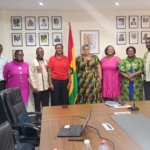
The International Facility Management Association (IFMA) Ghana Chapter, led by its Global Chair, Ms.Christa Dodoo, and the Chapter President, Mr. Sampson Opare-Agyemang, together with some members of the Chapter, paid a courtesy call on the Deputy Minister of Works and Housing, Gizella Tetteh-Agbotui, to explore opportunities for collaboration between the Association and government towards safeguarding and sustainably managing national properties.
During the meeting, Ms. Dodoo highlighted how IFMA has supported governments across the globe in strengthening facility management systems, citing successful examples from Nigeria and Singapore, where institutions have been established to regulate facility management practices.
She stated that Ghana already has the Public Works Department (PWD), which, if empowered, could take up a stronger role in ensuring effective management of public facilities.
Mr Tetteh-Agbotui, who expressed her appreciation for the profession, underscored the vital role facility management plays in national development.
Drawing from her experience in the construction of Kotoka International Airport’s Terminal 3, she noted the significant contribution of facility management in ensuring the project’s success.
“You cannot downplay the role of facility management,” she said.
“IFMA Ghana must intensify its advocacy to create more awareness of the profession’s importance.”
The Deputy Minister further assured the Association of her support and encouraged IFMA Ghana to continue engaging stakeholders to advance facility management as a critical component of sustainable infrastructure development.
Building on this commitment, IFMA Ghana presented key proposals on how it can support government to achieve its infrastructure goals, while also outlining areas where government’s partnership is needed.
The Association stressed that safeguarding Ghana’s infrastructure requires a shared responsibility between policymakers and professionals.
As part of the engagement, IFMA Ghana called for the championing of facility management policy integration in infrastructure planning and budgeting, to ensure that public projects are not only well-built but also well-maintained throughout their lifecycle.
The Association also proposed the establishment of a national facility management framework for public assets, which would provide clear standards and guidelines for managing the nation’s buildings and infrastructure.
To further strengthen accountability, IFMA Ghana urged government to mandate facility management roles in all public infrastructure projects, ensuring that every new asset has professional oversight from design through to operations.
Recognising the importance of capacity building, the Association appealed for support in facility management education and certification for government staff, equipping them with the knowledge and skills to manage public facilities effectively.
Finally, IFMA Ghana proposed the creation of a joint task force or working group with government to provide technical guidance, oversee implementation, and drive long-term collaboration in safeguarding national assets.
According to the Association, these measures would not only help protect Ghana’s investments in infrastructure but also generate long-term cost savings, improve service delivery, and ensure that public facilities continue to serve generations to come.
This engagement forms part of IFMA Ghana’s broader agenda to partner with government agencies in protecting and extending the lifespan of public buildings, thereby enhancing national development and sustainability.